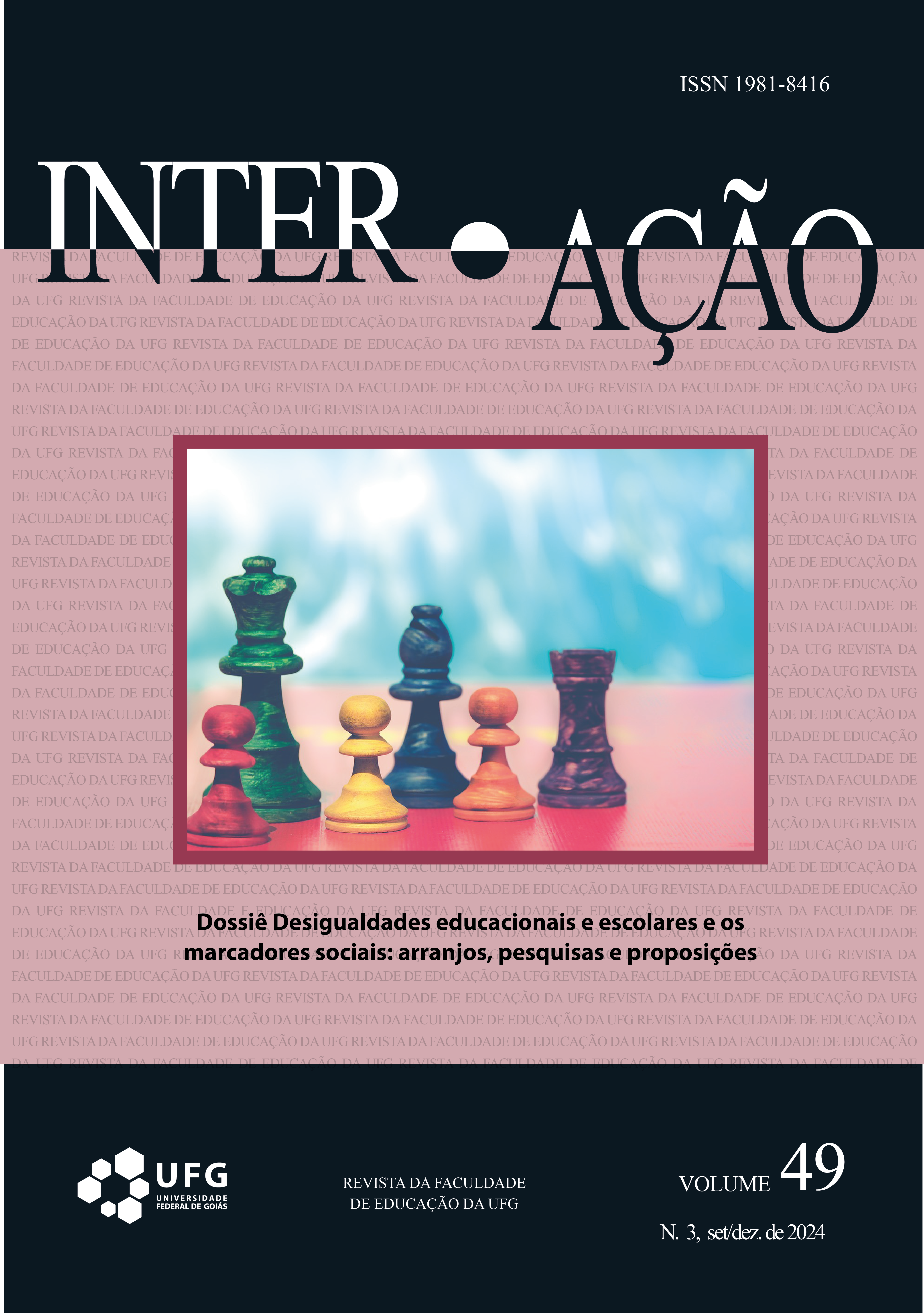EDUCATION FOR ETHNIC-RACIAL RELATIONS: BRIEF NOTES FOR PEDAGOGICAL COORDINATION
DOI:
https://doi.org/10.5216/ia.v49i3.80301Keywords:
Pedagogical Coordination, Education for Ethnic-Racial Relations, Law 10.639/2003/ Law 11.645/08.Abstract
This article presents results of research carried out with in the scope of the Professional Master's Program in Management and Technologies Applied to Education (GESTEC) at the State University of Bahia (UNEB), between the years 2022 and 2023, in the city of Salvador-Ba. The objective of the collaborative action-research, woven with subjects practicing daily schoollife in the Municipal Education Network (RME), was to describeth estrategic role of the Pedagogical Coordination in articulatinganti-racist educational practices based on pluriversity, dialogicity and transversality, as an ethical commitment-political co-responsibility and engagement of a school community. To this end, this study reveals, based on a qualitative approach and the use of devices such as bibliographical and documentary research and training dialogues, possibilities and notes for pedagogical intervention for pedagogical coordinators, aimingat the implementation of Law 10,639 /03 and Law 11,645/08 in formal learning spaces/times in the fieldof Basic Education.
Downloads
References
ALVES, Nilda. A necessidade de orientação coletiva nos estudos sobre o cotidiano: duas experiências. In: GARCIA, Regina Leite; ALVES, Nilda. A bússola do escrever. Rio de Janeiro: DP&A, 1997.
BRASIL. Lei nº 10.639, de 9 de janeiro de 2003. Disponível em: https://www.planalto.gov.br/ccivil_03/leis/2003/l10.639.htm. Acesso em: 13 mai. 2024.
BRASIL. Ministério da Educação. Base Nacional Comum Curricular. Brasília, 2018.
BRASIL. Ministério da Educação. CNE/CP 003/2004, Diretrizes Curriculares Nacionais para a Educação das Relações Étnico-raciais e para o Ensino de História e Cultura Afro-brasileira e Africana. Brasília, 2004.
BRASIL. Ministério da Educação. Diretrizes curriculares nacionais para a educação das relações étnico-raciais e para o ensino de história e cultura afro-brasileira e africana. Brasília, MEC/SECAD, 2004.
BRASIL. Ministério da Educação. Secretaria de Educação Continuada e Alfabetização e Diversidade. Orientações e Ações para a Educação das Relações Étnico-Raciais. Brasília. SECAD, 2010.
CARMO, Eliane Fátima Boa Morte do. História e cultura da África nos anos iniciais do ensino fundamental: os Adinkra. Artegraf, 2017.
CAVALCANTI, Ricardo Jorge de Sousa. Resenha. Verbum, v. 12, n. 1, p. 236-240, mai. 2023. Disponível em: https://revistas.pucsp.br/index.php/verbum/article/view/60483/42250. Acesso em: 20 mai. 2024.
FERREIRA, Taísa de Sousa. Alfabetização em perspectiva étnico-racial. Entrevista concedida em disciplina Alfabetização e letramento - Curso de Pedagogia UFBA, 2021.
GOMES, N. L. Alguns termos e conceitos presentes no debate sobre relações raciais no Brasil: Uma breve discussão. 2005.
GOMES, N. L.; ARAÚJO, M. (org.). Infâncias negras: vivências e lutas por uma vida justa. Petrópolis: Vozes, 2023
GOMES, Nilma Lino. In: MUNANGA, Kabengele (Org). Superando o Racismo na Escola. Ministério da Educação. Secretaria da Educação Continuada, Alfabetização e Diversidade, Edições MEC, Brasília, 2005.
LIBÂNEO, José C. Práticas de organização e gestão da escola: Objetivos e formas de funcionamento a serviço da aprendizagem de professores e alunos. Texto organizado para uso dos diretores de escola e coordenadores pedagógicos da rede de ensino da Secretaria Municipal de Educação de Cascavel (PR), 3/2/2015.
LIMA, Cledson Severino de. Teoria da Afrocentricidade e educação: um olhar afrocentrado para a educação do povo negro. Dissertação (Mestrado) - Universidade Federal de Pernambuco, CE. Programa de Pós-graduação em Educação, Recife, 2020. Disponível em: https://repositorio.ufpe.br/handle/123456789/39245. Acesso em: 23 mai. 2024.
MUNANGA, Kabengele. Superando o Racismo na Escola. Ministério da Educação. Secretaria da Educação Continuada, Alfabetização e Diversidade, Edições MEC, Brasília, 2005.
SALVADOR. Coordenador pedagógico: caminhos, desafios e aprendizagens para a prática educativa. Secretaria Municipal da Educação, Cultura, Esporte e Lazer; Avante Educação e Mobilização Social. Salvador, 2012.
SALVADOR. Lei complementar nº 36, de 30 de abril de 2004. Disponível em: https://leismunicipais.com.br/a/ba/s/salvador/lei-complementar/2004/4/36/lei-complementar-n-36-2004-dispoe-sobre-o-estatuto-dos-servidores-do-magisterio-publico-do-municipio-do-salvador. Acesso em: 24 mai. 2024.
SALVADOR. Referenciais Curriculares Municipal para os Anos Iniciais do
Ensino Fundamental. Salvador, 2018. Disponível em: http://educacao3.salvador.ba.gov.br/nossa-rede/. Acesso em: 23 mai. 2024.
SANTOS, C. L. N. dos, & DANTAS, T. R. Processos de Afrobetização e Letramento de (Re)Existências na Educação de Jovens e Adultos. Educação & Realidade, 45(1), 2020. Disponível em: https://seer.ufrgs.br/index.php/educacaoerealidade/article/view/9665. Acesso em: 23 mai. 2024.
SÃO PEDRO, Joilson Batista De; SANTOS, Carla Liane Nascimento dos. Relações étnico-raciais na educação de jovens e adultos: uma análise das práticas pedagógicas à luz da lei nº 10.639/2003 nas escolas de ensino fundamental do município de CAIRU-BA. In: Anais do VI Encontro Internacional de Alfabetização e Educação de Jovens e Adultos. Salvador (BA). Universidade do Estado da Bahia, 2019.
SILVA, Tomaz Tadeu da. Documentos de Identidade. Uma introdução às teorias do currículo. Belo Horizonte: Autêntica, 2021.
Published
How to Cite
Issue
Section
License
Copyright (c) 2024 Carla Liane Nascimento dos Santos, Eliecilda da Conceição Souza

This work is licensed under a Creative Commons Attribution-NonCommercial 4.0 International License.
Inter-Ação uses the Creative Commons Attribution 4.0 License for Open Access Journals (Open Archives Initiative - OAI) as the basis for the transfer of rights. Open access means making documents available on the Internet free of charge, so that users can read, download, copy, distribute, print, search, or link to the full text of documents, process them for indexing, use them as input data for software programs, or use them for any other lawful purpose, without financial, legal, or technical barriers.
Authors publishing in this journal agree to the following conditions:
1) Authors retain copyright and grant the journal the right of first publication, with the work simultaneously licensed under the Creative Commons Attribution License, which permits redistribution of the work with attribution and first publication in this journal.
2) Authors are permitted to enter into additional, separate agreements for non-exclusive distribution of the version of the work published in this journal (e.g., for publication in an institutional repository or as a book chapter), with attribution and first publication in this journal.
3) Authors are permitted and encouraged to publish and distribute their work online (e.g. in institutional repositories or on their home page) at any time before or during the editorial process, as this may generate productive changes as well as increase the impact and citation of the published work.















